Heart Disease Treatment Options and Management Strategies
Heart disease treatments focus on managing symptoms and supporting heart health through approaches like medication, lifestyle changes, and monitoring. Understanding these strategies and working with healthcare professionals can help individuals make informed choices for ongoing cardiovascular care.

Cardiovascular disease remains one of the leading health challenges in the United States, affecting nearly half of all adults according to recent statistics. The complexity of heart conditions requires multifaceted treatment approaches that address both immediate symptoms and long-term cardiovascular health. Modern medicine offers numerous pathways for managing heart disease, ranging from pharmaceutical interventions to comprehensive lifestyle modifications that can significantly improve patient outcomes.
Heart Disease Medications and Management Plans
Pharmaceutical treatments form the cornerstone of most heart disease management strategies. Common medications include ACE inhibitors, which help relax blood vessels and reduce blood pressure, and beta-blockers that slow heart rate and decrease the heart’s workload. Statins play a crucial role in managing cholesterol levels, while antiplatelet medications like aspirin help prevent blood clots. Diuretics assist in reducing fluid buildup, particularly beneficial for patients with heart failure.
Management plans typically involve regular monitoring through blood tests, electrocardiograms, and echocardiograms. Healthcare providers develop individualized medication regimens based on specific cardiac conditions, patient age, and overall health status. These plans often require periodic adjustments as patients respond to treatment or as their condition evolves over time.
Non-Invasive Heart Disease Treatment Options
Non-invasive approaches offer effective alternatives or complementary treatments to traditional surgical interventions. Cardiac rehabilitation programs combine supervised exercise training with education about heart-healthy living. These programs typically last 12-36 weeks and have shown significant success in improving cardiovascular function and reducing future cardiac events.
External counterpulsation therapy represents another non-invasive option, using inflatable cuffs around the legs to improve blood flow to the heart. Transcutaneous electrical nerve stimulation and other emerging therapies continue to expand treatment possibilities without requiring surgical procedures. Regular stress testing and monitoring help healthcare providers track progress and adjust treatment protocols accordingly.
Lifestyle and Dietary Heart Disease Treatments
Dietary modifications significantly impact heart disease management and prevention. The Mediterranean diet, rich in olive oil, fish, fruits, and vegetables, has demonstrated substantial cardiovascular benefits. Reducing sodium intake helps control blood pressure, while limiting saturated fats and trans fats can improve cholesterol profiles. Omega-3 fatty acids from fish or supplements support heart health and may reduce inflammation.
Regular physical activity strengthens the heart muscle and improves circulation. Most healthcare providers recommend at least 150 minutes of moderate-intensity exercise weekly, though individual recommendations vary based on current fitness levels and specific cardiac conditions. Stress management techniques, including meditation, yoga, and adequate sleep, complement dietary and exercise interventions by addressing psychological factors that can impact cardiovascular health.
| Treatment Category | Provider/Service | Cost Estimation |
|---|---|---|
| Cardiac Medications | CVS Pharmacy | $30-200 monthly |
| Cardiac Rehabilitation | Mayo Clinic | $1,500-3,000 per program |
| Nutritional Counseling | Registered Dietitians | $100-250 per session |
| Stress Testing | Local Cardiology Centers | $300-1,500 per test |
| Emergency Cardiac Care | Hospital Systems | $15,000-50,000+ |
Prices, rates, or cost estimates mentioned in this article are based on the latest available information but may change over time. Independent research is advised before making financial decisions.
Integrated treatment approaches often yield superior results compared to single-intervention strategies. Successful heart disease management typically combines appropriate medications with lifestyle modifications and regular medical monitoring. Patients working closely with cardiologists, primary care physicians, and other healthcare professionals can develop comprehensive treatment plans that address their specific needs and circumstances.
The landscape of heart disease treatment continues evolving with advances in medical technology and research. New medications, improved surgical techniques, and better understanding of cardiovascular risk factors contribute to more effective treatment options. Patients benefit from staying informed about emerging treatments while maintaining consistent adherence to established therapeutic approaches that have proven effective in managing their specific cardiac conditions.
This article is for informational purposes only and should not be considered medical advice. Please consult a qualified healthcare professional for personalized guidance and treatment.




